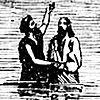- National Association of Free Will Baptists
-
Part of a series on Baptists  BackgroundKey figuresJohn Smyth
BackgroundKey figuresJohn Smyth
Thomas Helwys
Roger Williams
John Bunyan
Shubal Stearns
Andrew Fuller
Charles Spurgeon
D. N. Jackson
William Bullein Johnson Baptist portal
Baptist portalThe National Association of Free Will Baptists (NAFWB) is a national body of Free Will Baptist churches in the United States and Canada, organized on November 5, 1935 in Nashville, Tennessee. The National Association of Free Will Baptists traces its history in the United States through two different lines: one beginning in the South in 1727 (the "Palmer line") and another in the North in 1780 (the "Randall line"). The Association is the largest of the Free Will Baptist denominations.
Contents
History
In 1702, English General Baptists who had settled in the Province of Carolina requested help from the General Baptists in England. Though they did not receive help, native Paul Palmer labored there about twenty-five years later, and founded the first "General" or "Free Will" Baptist church in Chowan County, North Carolina, in 1727. Palmer organized at least three churches in North Carolina. From one church in 1727, they grew to over twenty churches by 1755. After 1755, the churches began to decrease and many churches and members became Particular Baptists. By 1770, only four churches and four ministers remained of the General Baptist persuasion. By the end of eighteenth century, these churches were being referred to as "Free Will Baptist." The churches in the "Palmer" line would again experience growth slowly in the nineteenth century. They organized various associations and conferences, and finally organized into the General Conference of Free Will Baptists in 1921.
Another "Free Will" movement rose in the North through the work of Benjamin Randall (1749-1808). Randall united with the Regular Baptists in 1776, but broke with them in 1779 due to his more liberal views on predestination. In 1780, Randall formed a "Free" Baptist church in New Durham, New Hampshire. More churches were founded, and in 1792 a Yearly Meeting was organized. This northern line of Free Will Baptists expanded rapidly, but the majority of the churches merged with the Northern Baptist Convention in 1911. A remnant of the Randall churches organized in 1917 as the Cooperative General Association of Free Will Baptists.
Representatives of the "Palmer" (General Conference) and "Randall" (Cooperative General Association) groups of Free Will Baptists met at Cofer's Chapel in Nashville, Tennessee, in 1935 and organized the National Association of Free Will Baptists as a merger of the two groups. The new association adopted the Treatise on the Faith and Practice of the Free Will Baptists, which has been revised several times since then. As of August 2005, the Association claims to have over 2,400 churches in forty-two states and fourteen foreign countries. The Association is actively involved in missionary work in the United States and throughout the world. The Association operates a publishing house called Randall House. Two colleges, the Free Will Baptist Bible College in Nashville, Tennessee, and the Hillsdale Free Will Baptist College in Moore, Oklahoma, are affiliated with the Association.
Theology
The churches of the National Association of Free Will Baptists are theological conservatives who hold an Arminian view of salvation and eternal security. The differ from the larger body of Baptists in holding three ordinances rather than two, namely: Believer's Baptism, the Lord's supper, and the washing of feet. Anointing with oil is also practiced in some churches.
Membership
Since the middle of the twentieth century, membership has remained near 200,000. In 2005, the Association reported having 2,425 churches and 198,924 members.[1] Membership is concentrated in the South. The states with the highest membership rates are Arkansas, Oklahoma, West Virginia, Alabama, and Kentucky.[2]
References
Sources
- Davidson, William (2001). The Free Will Baptists in History. Nashville: Randall House Publications. ISBN 0892659556.
- Jones, Dale (2002). Religious Congregations & Membership in the United States 2000. Atlanta: Glenmary Research Center. ISBN 091442226X.
- Pinson, J. Matthew (1998). A Free Will Baptist Handbook: Heritage, Beliefs, and Ministries. Nashville: Randall House Publications. ISBN 0892656883.
- Wardin, Albert (1995). Baptists around the World. Nashville: Broadman & Holman. ISBN 0805410767.
External links
- National Association of Free Will Baptists
- Randall House Publishing
- ONE Magazine: The Magazine for Free Will Baptists
- A Treatise of the Faith and Practices of the National Association of Free Will Baptists
- Profile of the National Association of Free Will Baptists on the Association of Religion Data Archives website
Categories:- Arminian denominations
- Baptist denominations in North America
- Free Will Baptists
- Religious organizations established in 1935
- Baptist denominations and unions established in the 20th century
Wikimedia Foundation. 2010.
